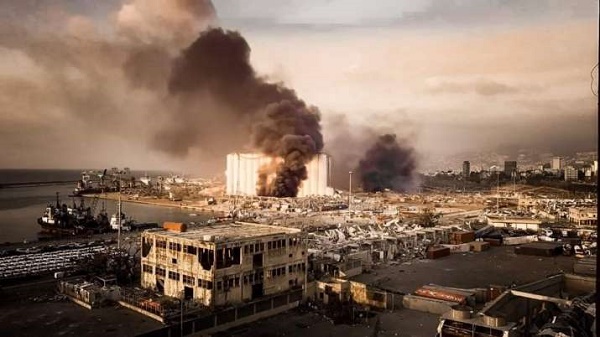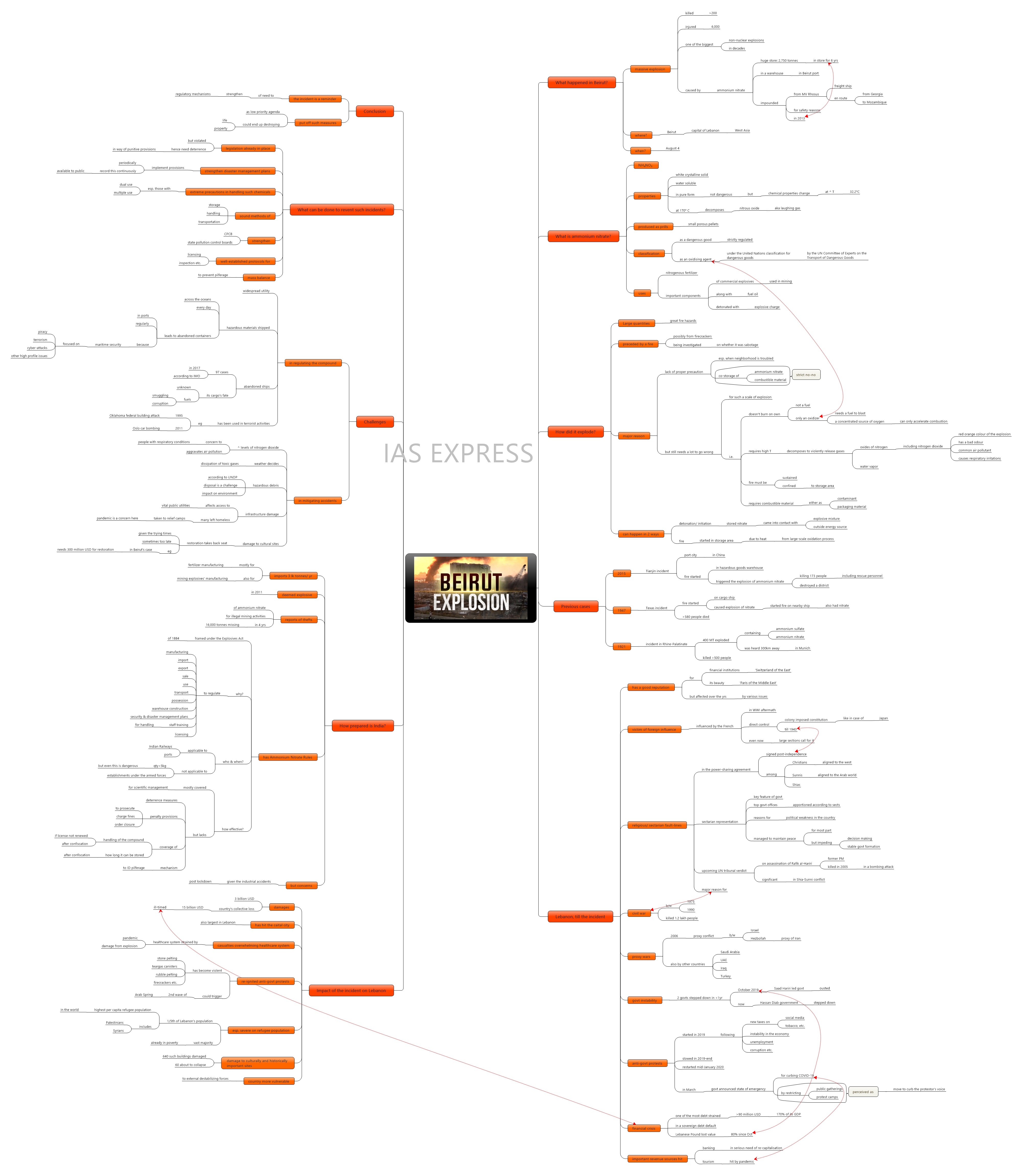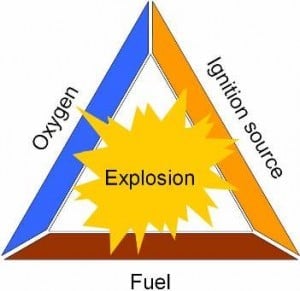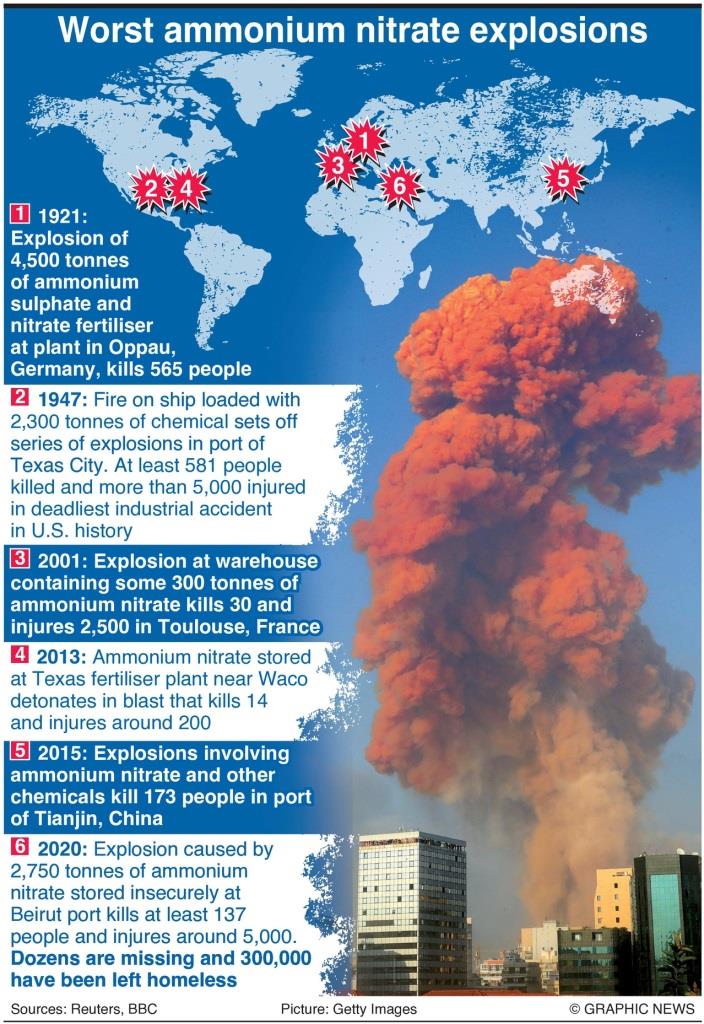Beirut Explosion- Need for Regulation of Ammonium Nitrate

From Current Affairs Notes for UPSC » Editorials & In-depths » This topic
IAS EXPRESS Vs UPSC Prelims 2024: 85+ questions reflected
The Beirut explosion has triggered widespread public anger in Lebanon leading to violent protests and resignation of the government. The explosion is one of the worst in several years and has resulted in casualties in a time when the healthcare system is stressed to its limits. In the context of such an incident, there is a need to look at India’s preparedness to handle a disaster on such a scale.
What happened in Beirut?
- On August 4th, a massive explosion rocked Beirut, the capital of the West Asian country, Lebanon.
- It has killed over 200 people and injured another 6,000.
- The explosion is one of the biggest non-nuclear explosions in several decades. It was felt 240 km away– in Cyprus.
- The source of the explosion was a huge store of ammonium nitrate (2,750 tonnes) in a warehouse at the Beirut port.
- The compound was impounded for safety reasons from a freight ship, MV Rhosus, which was en route to Mozambique from Georgia in 2013.
- This had been stored in the warehouse for 6 years.
What is ammonium nitrate?
- Ammonium nitrate or NH₄NO₃ is a white crystalline salt that is produced from ammonia and nitric acid. It is soluble in water.
- It is not dangerous in its pure form. However, its chemical property changes at high temperatures (2°C).
- At the temperature of 170° C, it breaks down to emit nitrous oxide (also called the laughing gas).
- It is produced in the form of ‘prills’ which are small porous pellets.
- It is classified as a dangerous goods. All aspects of its use are strictly regulated
- It is classified as an oxidising agent under the United Nations classification for dangerous goods given by the UN Committee of Experts on the Transport of Dangerous Goods.
Uses:
- It is one of the most commonly used nitrogenous fertilizers in the world.
- It is also a base component of commercial explosives– used in mining. It is used in combination with fuel oil and is detonated by an explosive charge.
How did it explode?
- Large quantities of ammonium nitrate are great fire hazards.
- The explosion is said to have been preceded by a fire– possibly from firecrackers.
- Possibility of it being an act of sabotage are being investigated.
- A major reason for the recent blast was lack of proper precaution. This is especially so when there is so much trouble in the West Asian neighbourhood.
- Experts have been questioning the rationale behind storing the compound near combustible material. Co-storage of ammonium nitrate and a fire source is a strict no-no.
- Explosions of large stockpiles can occur in 2 ways:
- By detonation or initiation of some sort- when the stored nitrate comes into contact with an explosive mixture or an outside energy
- By a fire– when a fire starts in the storage due to the heat generated from the oxidation process on a large scale.
- Though it is a major fire hazard, a lot needs to go wrong for a Beirut-scale blast to actually occur.
- The compound doesn’t burn on its own. It is only a concentrated source of oxygen i.e. an oxidiser and not the fuel. This means that it can only accelerate the combustion of other materials.
- At a high enough temperature, the compound decomposes violently releasing gases like oxides of nitrogen and water vapour. This rapid release of gases causes the explosion.
- The red orange colour of the explosion can be attributed to one of these oxides- nitrogen dioxide. Nitrogen dioxide has a bad odour and is a common air pollutant known for causing respiratory irritations.
- Not any fire can set off an explosion of ammonium nitrate. The fire needs to be sustained and it must be confined in the same area where the nitrate is stored.
- The nitrate also requires combustible material (as fuel)- either as a contaminant or packaging material for the explosion.
Have there been previous such cases?
- This isn’t the first such incident. Multiple cases have been reported worldwide.
- In 2015, a fire started in a hazardous goods warehouse in Tianjin, a port city in China. The fire triggered the explosion of ammonium nitrate killing 173 people including rescue personnel. It destroyed an entire district.
- In 1947, a fire started on a cargo ship during the loading process in Texas. The ship already had a huge stockpile of ammonium nitrate. The nitrate exploded causing another fire on a nearby ship which also held ammonium nitrate. More than 580 people were killed in the Texas incident.
- In 1921, a 400 MT mixture of ammonium sulphate and ammonium nitrate exploded in Rhineland-Palatinate, killing over 500 people. The blast was heard 300km away in Munich.
How has Lebanon been faring till the incident?
- Lebanon used to have a glittering reputation as the ‘Switzerland of the East’ in recognition of its financial institutions and as the ‘Paris of the Middle East’ for it beauty.
- However, over the years, it has been an unfortunate country- ridden with civil wars, invasions and proxy wars by foreign players.
- The country has been a victim of foreign influence for a long time- in the aftermath of the World War I, it was under the direct control of the French during which time it was ruled by a colony imposed constitutions– like in case of Japan.
- In the post-independence period, a power-broking agreement was signed between the major communities- the Christians (aligned to the west), the Sunnis (aligned to the Arab world) and the Shias. Yet, the religious fault-lines persisted under the surface.
- These fault-lines had a major role in the civil war which ravaged the country between 1975 and 1990, killing 2 lakh people.
- Even now, a large section of the Christian population in Lebanon supports French influence in the country.
- A number of proxy wars have also afflicted Lebanon. In 2006, Israeli forces battled the Hezbollah in Lebanon- a proxy of Iran. Other countries like Saudi Arabia, Iraq, UAE and Turkey has also dabbled in Lebanon’s internal affairs.
- Sectarian representation is a key feature of the Lebanese government, with top government offices being apportioned according to sects. This is one of the factors responsible for political weakness in the country.
- While it managed to maintain peace in the country for the most part, it has greatly impeded any decision making and stable government formation.
- In October 2019, Saad Hariri led government was ousted. It was replaced by the Hassan Diab government. This government has also been dismantled in a matter of months i.e. 2 governments have stepped down in less than a year’s time.
- The country had already been tensed as a UN tribunal is set to give its verdict on the assassination of Rafik al-Hariri, the former Prime Minister. He was killed in 2005 in a bombing attack. This verdict is significant because at its core is the Shia-Sunni conflict.
- Anti-government protests started in 2019, following the announcement of new taxes during the budget season- on a range of things from tobacco to social media.
- The public anger escalated against the instability in the economy, unemployment and corruption. The protests petered down by the end of 2019. However, it restarted in mid-January this year.
- In March, the Lebanese government declared a state of emergency to deal with the COVID-19 pandemic. This raised fears of a further setback to an already beleaguered country.
- The government’s move to remove protest camps and prevent public gatherings were interpreted as a move to curb the protestor’s voice.
- At the same time, the financial crisis in Lebanon ended up in a sovereign debt default. The Lebanese currency’s (Lebanese Pound) value was affected. The currency has lost 80% of its value since October.
- Lebanon is currently one of the most debt strained countries in the world. It has a debt of over 90 million USD– which is 170% of its GDP.
- This is of serious concern as Beirut is mainly a banking hub and the banks are in serious need of recapitalization. Its other main revenue source, tourism, has been hit by coronavirus.
How has the blast affected Lebanon?
- The explosion has caused damages worth 3 billion USD. The country’s collective loss has been pegged at 15 billion USD.
- This is very ill-timed as the country has been suffering from a serious financial crisis at the centre of which is a currency crisis.
- The country’s capital city, which is also the largest in Lebanon, has been damaged.
- The casualties from the blast has overwhelmed the health care system in Beirut. This is because the healthcare facilities themselves have been damaged by the explosion and have also been working at full capacity due to the pandemic.
- It has re-ignited the anti-government protests in Lebanon. The protests, which till the incident had been largely peaceful, took a violent turn– with stone pelting, launching of firecrackers, rubble and teargas canisters.
- It could trigger a second wave of Arab Spring.
- The incident has been especially severe on the refugee population. Lebanon has the highest per capita refugee population in the world- 1/5th is refugees, including Palestinian and Syrian Vast majority of them already live in poverty.
- Apart from this, culturally and historically important sites have suffered damage. About 640 such buildings are damaged and 60 of these are at the risk of completely collapsing.
- All this makes the country even more vulnerable to external destabilizing forces.
How prepared in India for such an incident?
- India imports about 3 lakh tonnes of ammonium nitrate every year. Most of it is used for manufacturing fertilizers while a smaller portion goes into making mining explosives.
- Over the years, there have been reports of ammonium nitrate thefts for illegal mining activities. In a span of 4 years, 16,000 tonnes of the compound has gone missing.
- India has an Ammonium Nitrate Rules, 2012 to regulate the compound. However, it isn’t applicable for quantities less than 5 kg. Note that even such small amounts can be dangerous.
- There have been concerns about India’s emergency response preparedness in case of similar accidents domestically. This is especially amplified by the recent string of industrial accidents post imposition of lockdown.
Ammonium Nitrate Rules, 2012:
- Indian government deemed ammonium nitrate an explosive in 2011.
- The rules were framed under the Explosives Act of 1884.
- It gives rules for regulation of manufacture, import, export, transport, possession, sale and use of the compound, warehouse construction, security and disaster management plans, staff training for handling the compound and licensing.
- It is applicable to Indian Railways and the ports.
- It isn’t applicable to establishments under the armed forces.
How effective are these rules?
- These rules are comprehensive and for most part covers the various aspects needed for scientific management of this dangerous compound.
- A major issue is the lack of deterrence mechanism or penalty provisions.
- It doesn’t have any provision to prosecute, charge fines or even order closure on the violators.
- There isn’t any mention of handling of the compound in case the license for storage isn’t renewed.
- It doesn’t cover the handling of the compound after confiscation or the period for which the port authorities can store the confiscated compound- a very important aspect as seen from the Beirut explosion case.
- There isn’t any mechanism to identify pilferage.
What are the challenges?
In regulating the compound:
- There is a challenge in regulating the use of ammonium nitrate as it has widespread utility.
- Many types of hazardous materials, let alone ammonium nitrate, are shipped across the oceans every day. Abandoned containers of these materials in the ports is a regular find.
- One reason is maritime security is more focused on curbing more high-profile issues like piracy, cyber-attacks and terrorism.
- A step further, abandoned ships is also a major issue across the world. In 2017 itself, IMO recorded 97 cases of abandoned ships. The fate of its cargo is often unclear. This fuels smuggling and corruption.
- The compound has been used in the past to carryout terror attacks. In 1995, it was used to bomb the federal building in Oklahoma in the USA. It was also used in the 2011 Oslo car bombing.
In mitigating accidents involving the compound:
- High levels of nitrogen dioxide is of major concern to people with respiratory conditions. It will also aggravate the air pollution levels.
- The weather has a hand in how quickly or in which way the toxic gases released from the explosion dissipate.
- The UN Development Program has warned of hazardous debris from the explosion. A huge portion of it could be toxic. Safe disposal is a major challenge.
- Such toxic debris will also have an impact on the environment.
- Given the damage to infrastructure, access to vital public utilities are affected. Many are left homeless. This means that people are accommodated in relief camps which is also a cause for concern given the pandemic situation.
- A lot of the cultural heritage sites and structures are damaged. In such trying times, restoration efforts take a back seat and may never be taken up until its too late. In Lebanon’s case, restoration efforts would require 300 million USD– not an easy feat amidst more pressing concern.
What can be done to prevent such an occurrence in India?
- Though India has a legislative framework in place, it is frequently violated. There is a need for deterrence in the way of punitive provisions.
- Existing disaster management plans must be strengthened.
- The provisions under such a plan must be implemented periodically and a continuous record of this must be made available to the public.
- Extreme precaution must be taken in regulation of chemicals- especially those with dual or even multiple uses.
- A key requirement is sound storage, handling and transport mechanism for the chemicals.
- Central and state pollution control boards need to be strengthened in terms of manpower and infrastructure to prevent such industrial accidents.
- Need to establish well-defined protocols for licensing, inspection, etc.
- Mass balance needed to prevent pilferage.
Conclusion
The Beirut incident is a reminder of the pressing need to strengthen regulatory mechanisms with regards to hazardous materials like ammonium nitrate. Putting off such measures as low priority agenda can end up destroying life and property to an extraordinary degree.
Practice questions for mains
“The accident in Beirut is a reminder that despite the strict regulation of hazardous substances internationally, the risks remain.” Comment. (250 words)
If you like this post, please share your feedback in the comments section below so that we will upload more posts like this.





